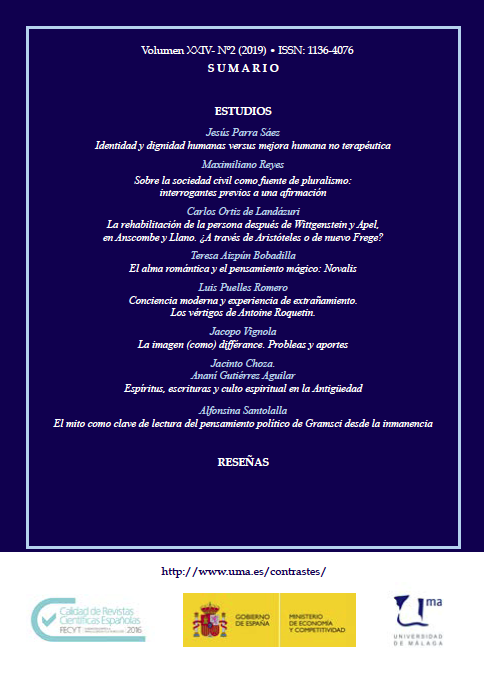Human identity and human dignity versus non-therapeutic human enhancement
DOI:
https://doi.org/10.24310/Contrastescontrastes.v24i2.6860Keywords:
HUMAN ENHANCEMENT, DDignity, Identity, Biotechnology, BioconservatismAbstract
In the contemporary scientific-ethical debate on biotechnological human enhancement, the notions of human identity and human dignity are used habitually by the most conservative line of thought to reject the application of new biomedical technologies on the human being with the aim of carrying out an improvement of a non-therapeutic nature. However, are they useful as an argument to reject a human enhancement of a perfectionist nature? In this article, we will analyze the meaning of both notions in the contemporary bioethical debate, as well asthe validity of their use as an argument to reject itDownloads
Metrics
Publication Facts
Reviewer profiles N/A
Author statements
Indexed in
-
—
- Academic society
- N/A
- Publisher
- Universidad de Málaga
References
AGAR, N. 2014: Truly human enhancement. A philosophical defense of limits. Cambridge: MIT Press.
ANDORNO, R. 1998: Bioética y dignidad de la persona. Madrid: Tecnos.
ANNAS, G et al. 2002: «Protecting the endangered human: toward an international treaty prohibiting cloning and inheritable alterations», American Journal of Law and Medicine, 28, pp. 151-178.
APARISI, Á. 2013: «El principio de la dignidad humana como fundamento de un bioderecho global», Cuadernos de bioética, 24/2, pp. 201-221.
BELLVER, V. 2012: «El debate sobre el mejoramiento humano y la dignidad humana: una crítica a Nick Bostrom», Teoría y Derecho. Revista de pensamiento jurídico, 11, pp. 82-93.
BOSTROM, N. 2005: «In defense of posthuman identity», Bioethics, 19/3, pp. 202-214.
BOSTROM, N y ORD, T. 2006: «The reversal test: eliminating Status Quo bias in applied ethics», Ethics, 116, pp. 656-679.
BOSTROM, N. 2008: «Dignity and Enhancement», en: Schulman A (ed.), Human dignity and bioethics: Essays commissioned by the president’s council on bioethics. Washington D.C.: President’s Council on Bioethics, pp. 173-207.
CABRERA, L. 2017: «Personas y seres humanos ¿distinction o identidad? », IUS ET SCIENTIA, 3/1, pp. 114-124.
CAMPS, V. 2002: «¿Qué hay de malo en la eugenesia?». Isegoría, 27, pp. 55-72.
CANTARINO, E. 2015: «Identidad y alteridad como constructos psicoeducativos y neurocognitivos», en: Ortega C; Richart, A; Páramo V y Ruíz C (eds.), El mejoramiento humano: avances, investigaciones y reflexiones éticas y políticas, Granada: Comares, pp. 807-818.
CINCUNEGUI, J. 2015: «Modelos de identidad. Hermenéutica, filosofía analítica y el cuasi-budismo de Derek Parfit». Nuevo Pensamiento, 5/6, pp. 1-51.
DEGRAZIA, D. 2005: «Enhancement Technologies and Human Identity». Journal of Medicine and Philosophy, 30, pp. 261-283.
DE MIGUEL BERIAIN, Í. 2018a: «Should human germ line editing be allowed? Some suggestions on the basis of the existing regulatory framework», Bioethics, 00, 1-7.
DE MIGUEL BERIAIN, Í. 2018b: «Problemas éticos y jurídicos que plantea la edición genética mediante CRISPR-Cas: un breve comentario», Genética médica y genómica, 0, pp. 1-3.
GLANNON, W. 2002: «Identity, prudential concern, and extended lives». Bioethics, 16/3, pp. 266-283.
GONZÁLEZ VALENZUELA, J. 2005: Genoma Humano y Dignidad Humana. Barcelona: Anthropos Editorial.
KANT, I. 2008: Metafísica de las costumbres. Madrid: Editorial Tecnos.
KASS, L. 2004: Life, liberty and the defense of dignity: the challenge for bioethics. New York: Encounter Books.
KASS, L. 2008: «Defending human dignity», en: Schulman, A (ed.), Human dignity and bioethics: Essays commissioned by the president’s council on bioethics. Washington D.C.: President’s Council on Bioethics, pp. 297-331.
LAING, J. 2009: «Los Derechos Humanos y la nueva eugenesia». SCIO, 4, pp. 65-80.
LAPORTA, F. 2013: «Identidad y derecho». Anuario de la Facultad de Derecho de la Universidad Autónoma de Madrid, 17, pp. 17-38.
LÓPEZ FRÍAS, F. 2014: «Dignidad y bioética: el caso de las intervenciones biotecnológicas de mejora de la especie». Thémata, 49, pp. 203-215.
PARFIT, D. 1983: «Identidad personal». Cuadernos de crítica, 25, pp. 5-36.
PARFIT, D. 2004: Razones y personas. Madrid: Machado Libros.
POSTIGO SOLANA, E y DÍAZ DE TERÁN, M. 2004: «Nueva eugenesia: la selección de embriones In Vitro», en: Ángela Aparisi y Jesús Ballesteros (eds.), Biotecnología, dignidad y derecho: bases para un diálogo, Navarra: EUNSA, pp. 79-113.
ROMEO CASABONA, C. 1994: El Derecho y la Bioética ante los límites de la vida humana. Madrid: Editorial Centro de Estudios Ramón Areces.
SAGOLS, L. 2010: «¿Es ética la eugenesia contemporánea?», Dilemata, 2/3, pp. 27-43.
SALLES, A. 2015: «La neurociencia y la identidad: un debate abierto», en: Ortega C; Richart, A; Páramo V y Ruíz C (eds.). El mejoramiento humano: avances, investigaciones y reflexiones éticas y políticas, Granada: Comares, pp. 57-66.
SANDEL, M. 2015: Contra la perfección. La ética en la era de la ingeniería genética. Barcelona: Marbot.
SPINELLA, L. 2012: «El sujeto de derecho a reivindicar: la Humanidad. La dignidad humana frente al patentamiento de la información genética humana», Revista Facultad de Derecho y Ciencias Políticas, 42/116, pp. 297-328.
Downloads
Published
How to Cite
Issue
Section
License
This journal provides immediate free access to its content under the principle of making research freely available to the public. All content published in Contrastes. Revista Internacional de Filosofía, are subject to the Creative Commons Attribution-NonCommercial-ShareAlike 4.0 license whose full text can be found at <http://creativecommons.org/licenses/by-nc-sa/4.0>
It is the responsibility of the authors to obtain the necessary permissions of the images that are subject to copyright.
Authors whose contributions are accepted for publication in this journal will retain the non-exclusive right to use their contributions for academic, research and educational purposes, including self-archiving or repository in open access repositories of any kind.
The electronic edition of this magazine is edited by the Editorial Service of the University of Malaga (Uma Editorial), being necessary to cite the origin in any partial or total reproduction.










5.png)
